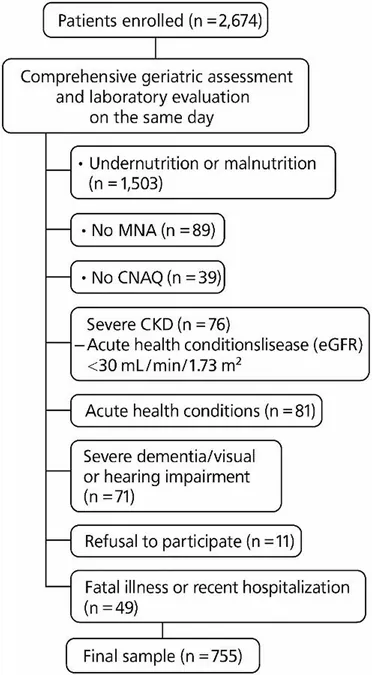
The Hidden Crisis: Appetite Loss Among Seniors Could Signal Serious Health Issues
2025-08-19
Author: Siti
Understanding Appetite Loss in Older Adults
In a startling revelation, one in four older adults, despite having normal nutritional status, are grappling with a loss of appetite. This condition, often overlooked, may foreshadow significant health challenges that could lead to malnutrition if not addressed promptly.
Study Insights and Demographics
A recent study involving 755 outpatients aged 65 and older set out to understand the implications of appetite loss in seniors. Conducted in Turkey between 2018 and 2024, the findings highlight key demographics: the average participant was 78.6 years old, predominantly female (66.8%), with 192 individuals, or 25.4%, reported experiencing a reduced appetite.
What Contributes to Appetite Loss?
The research identified several factors linked to appetite loss: advanced age, female gender, lower education levels, and the presence of chronic kidney disease. Intriguingly, those with appetite loss were also more likely to be taking multiple medications, a phenomenon known as polypharmacy, which can complicate overall health and wellbeing.
The Clinical Implications
This appetite reduction not only signals potential nutritional deficiencies but also correlates with a host of other concerning issues like impaired balance, diminished mobility, and increased depressive symptoms. Even when nutritional status appears stable, an elderly person suffering from appetite loss may be at a heightened risk for falls and other geriatric syndromes.
Wider Health Risks Connected to Appetite Loss
Research reveals that seniors with appetite loss are not just facing immediate physical drawbacks. Loss of interest in food can lead to severe health repercussions such as malnutrition, increased mortality rates, and complications related to chronic diseases. Studies indicate that appetite loss can raise the risk of death by up to 35%.
A Call to Action: Identifying and Addressing Appetite Loss
This study emphasizes the urgent need for healthcare providers to recognize and address appetite loss in the elderly. Early interventions could significantly alter the trajectory of health outcomes for those at risk. An increased focus on nutritional screening in routine geriatric assessments may lead to timely nutritional interventions, ultimately improving quality of life.
Conclusion: The Unseen Danger in Aging
Although appetite loss may seem like a minor inconvenience, it represents a critical area of concern for senior health. As more individuals navigate the challenges of aging, understanding the multifaceted nature of appetite loss and its far-reaching effects could be the key to enhancing health management strategies for older adults.

 Brasil (PT)
Brasil (PT)
 Canada (EN)
Canada (EN)
 Chile (ES)
Chile (ES)
 Česko (CS)
Česko (CS)
 대한민국 (KO)
대한민국 (KO)
 España (ES)
España (ES)
 France (FR)
France (FR)
 Hong Kong (EN)
Hong Kong (EN)
 Italia (IT)
Italia (IT)
 日本 (JA)
日本 (JA)
 Magyarország (HU)
Magyarország (HU)
 Norge (NO)
Norge (NO)
 Polska (PL)
Polska (PL)
 Schweiz (DE)
Schweiz (DE)
 Singapore (EN)
Singapore (EN)
 Sverige (SV)
Sverige (SV)
 Suomi (FI)
Suomi (FI)
 Türkiye (TR)
Türkiye (TR)
 الإمارات العربية المتحدة (AR)
الإمارات العربية المتحدة (AR)